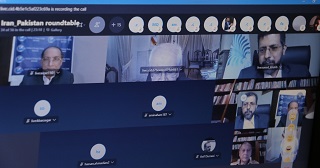Press Release
Webinar
Iran, Pakistan and South Asia Under the Pandemic
Institute of Strategic Studies Islamabad
in collaboration with
Institute for Political and International Studies, Tehran
July 14, 2020
Institute of Strategic Studies, Islamabad (ISSI) in collaboration with Institute for Political & International Studies (IPIS), Tehran hosted the 16th bilateral dialogue on “ Iran, Pakistan and South Asia Under the Pandemic”on July 14, 2020 through a weblink. Dr. Kazem Sajjadpour,President, IPIS while welcoming the guests to this very important webinar highlighted issues that plague the region, particularly the situation in Afghanistan. He hoped that friendly, frank and fruitful discussion will help both the countries to overcome challenges that threaten peace and tranquility in the region.
Ambassador Aizaz Ahmed Chaudhry, DG ISSI said thatthe global politics is in a state of flux due to political situation in the US and its upcoming elections. US policy to contain the rise of China through its Pivot to Asia policy has also, in the process, encouraged India to have dangerous regional ambitions. On Iran-Pakistan bilateral ties, the Director General said that it is important for both the countries to maintain good relations as the two sides have never had any political disputes.
The first session of the webinar specifically focused on “West and South Asia, Iran-Pakistan Bilateral Relations”. Seyed Rasoul Mousavi, Director General for West Asia, Ministry of Foreign Affairs, Iran, spoke on managing the bilateral relationship during the times of the pandemic. He highlighted importance of people-to-people relationship between the two countries by utilizing the 900 km shared border as an opportunity for cooperation rather than perceiving it as a threat.
Mr. Asif Hussain Menon, Director General, Afghanistan, Iran & Turkey, Ministry of Foreign Affairs , Pakistan emphasized that the border between Iran and Pakistan is actually a border of opportunity as it is a more than 900 km long and still, both the countries have not faced any major political dispute. Making a strong case for more economic activity between the two countries, Mr. Asif Hussain said that the location of both the countries at international trading routes provides an opportunity to strengthen connectivity to Middle East, Central Asia and Europe which will be beneficial for not only Iran and Pakistan but also the region itself.
Kayhan Barzegar,Director, Center for Middle East Strategic Studies reiterated the fact that both the countries never joined any alliance against each other’s interests which speaks volumes of the depth of the relationship. He also appreciated the fact that Pakistan values its relations with both Iran and Saudi Arabia and in fact plays its due role in decreasing the misunderstandings between the two countries. He also stressed that Iran should also exercise balance in pursuing its relationship with both Pakistan and India.
Ambassador Javid Husain,former Ambassador to Iran said that historical, cultural and religious commonalities calls for the closest cooperation between Iran and Pakistan in political, security, strategic economic, commercial and technical fields. Security and economic well-being of Iran and Pakistan are closely linked. He suggested that consultation on bilateral issues should be a regular feature of bilateral relations. Both the countries should also coordinate their efforts to ensure durable peace in Afghanistan through an Afghan-owned and Afghan-led process. India’s desire of hegemony and Kashmir struggle are areas where Iran and Pakistan need to cooperate and coordinate. Both countries also need to closely cooperate to deal with terrorism and drug trafficking. He also suggested that China should be made part of the IP gas pipeline project.
The second session of the webinat focused on “”Regional Developments: Afghanistan, Subcontinent and Persian Gulf“.
Mojtaba Rouzbahani, Senior Fellow, IPIS stated that Islamic republic of Iran has played its peaceful role to shape the future of Afghanistan. In 2020, peace and stability is returning to Afghanistan and the signing of peace agreement between US and Taliban is considered an important and influential development. Some players are trying to influence terrorists and extremist to pursue their interests. Iran has been clear enough to support the preservation of the constitution of Afghanistan. The country needs the support of its neighbors for a mutually beneficial arrangement during and after the peace process. Afghanistan should not be a matter of competition but a matter of cooperation between Tehran and Islamabad.
Amina Khan, Director, Centre for Middle East & Africa, ISSI in her remarks said after decades of bloodshed US and Taliban signed a peace agreement. The deal is based on four points that is withdrawal of US forces, a ceasefire, Intra-Afghan negotiations and Counter-terrorism assurances. Despite many hurdles, there have been a number of constructive developments like the 3-day ceasefire by Taliban and release of 2000 prisoners. However, the highs can be easily replaced with the lows in the case of Afghanistan. Since the signing of the agreement, Taliban have come out as the most responsible actor. They have also halted operations against foreign forces but continue to attack the Afghan forces. Although there is no discussion on the future of the political structure for now, the fact remains that if we consider the 19 years of bloodshed, this is not the perfect option, but for now the best option that the Afghans have.
Mir Mahmoud Mousavi, Iran’s former Ambassador to India and Pakistan stated that stability and security is the same as of last year. There have been terror attacks and drug trafficking also continues. It is important to highlight that the growing nationalism in India is going to be problematic for the whole region. The increasing role of China in the region has also increased in the recent years and leading to a new polarization. Within last few years, President Trump has also shown an inclination of not having a solid policy for the region. He opined that the peace deal in Afghanistan is not going to be a long lasting one. There is a lot of optimism in the air but the world doesn’t work on that, it works on supremacy.
Hassan Ahmadian, Professor, University of Tehran stated that the Persian Gulf is considered to be a part of Iran’s national security and a secure and stable Persian Gulf has always been a part of its strategic objective and a priority in the foreign policy. Extra-regional powers also have an inherent interest in the well-being of the Persian Gulf. That is why Iran has come up with a number of regional arrangements for the Persian Gulf security which are inclusive in nature unlike the US-led initiatives. Iran has maintained good relations with the GCC countries but the relations with Bahrain and Saudi Arabia have gone sore. Pakistan can play an important role as a peace broker between Iran and Saudi Arabia. US works on the mutual exclusive goal of securing the Gulf excluding Iran. As a result, the region is pushed towards imbalances. The US pressure on Iran is not exclusive to Iran but also targeting Iran-Pakistan relations and thus targeting regional cooperation and integration. A counter can be to make the mutual projects trilateral and have China on board to mitigate the pressure.
Ambassador Asif Durrani, former ambassador of Pakistan to Iran in his remarks stated that instability in Persian Gulf will have an impact on the whole region and the Muslim world as well. Pakistan has supported and has stood by Iran in the time of thick and thin. Pakistan voted in favor of Iran even at the IAEA in 2008 when even India voted against it. Iran is the second largest economy in the MENA region and if Iran is not on the path of development, its resources and potential will only go to waste. Iran needs to improve the comfort level of its small neighbor states. Pakistan should also engage positively with Iran and should incorporate China into the gas pipeline project to mitigate the American pressure.
Dr. Kazem Sajjadpour, President, IPIS in his closing remarks praised the speakers and applauded the efforts of the both institutes. He emphasized on the importance of institutional and foundational connectivity for the nurturing of the relationship between the two countries. This, he said, would also add new dimensions to the relationship. There are fundamental changes happening in the international relationships and this will have an impact on Pakistan and Iran as well. It is upon us to frame a comprehensive regional vision so we can understand and analyze at the policy level and also discuss at a broader level. We also need a new regional vision for the solution of Kashmir and creating a comfort level in the Persian Gulf. Iran, Pakistan and China should move towards more cooperation and redefine the region.












